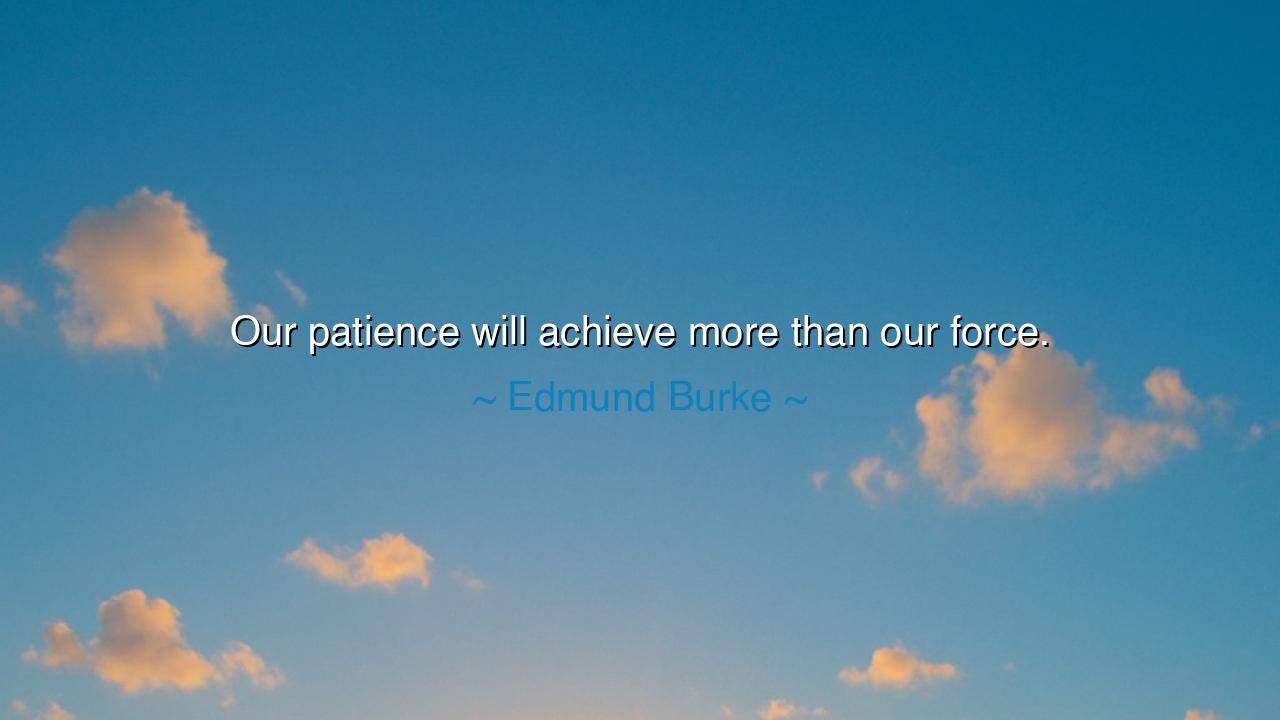
Our patience will achieve more than our force.






The words of Edmund Burke—“Our patience will achieve more than our force”—resound with the wisdom of one who understood both the fire of passion and the quiet endurance of restraint. Force may seem powerful in the moment; it is loud, immediate, and demands attention. Yet force burns quickly, leaving ashes in its wake. Patience, however, is steady, enduring, and transformative. It works in silence, but it achieves what brute strength cannot. Burke, as a statesman and philosopher, had seen how empires rose and fell, how revolutions ignited and consumed, and he knew that the victories of patience often outlast the triumphs of violence.
The origin of this thought comes from Burke’s role in the turbulent age of the eighteenth century, when revolutions and wars shook the foundations of nations. He cautioned against rash force, warning that lasting change is built not upon destruction but upon careful cultivation, much like a farmer tending the field. He knew that impatience leads men to wield their strength recklessly, only to find that their victories collapse. Patience, on the other hand, lays deep roots, ensuring that what is gained is not lost with the passing of storms.
History gives us countless proofs of Burke’s wisdom. Consider Mahatma Gandhi, who faced one of the mightiest empires in history with no army, no weapons, only the patient force of nonviolence. Many mocked him, saying his patience was weakness. Yet it was patience that brought down colonial rule, while force could only have brought rivers of blood. Gandhi’s patient endurance inspired the world and achieved what centuries of conflict had not: the liberation of a nation. Truly, patience achieved more than force.
Likewise, in the long story of Abraham Lincoln during the American Civil War, his greatness was not only in the might of armies, but in his patient vision for union and reconciliation. He endured criticism, betrayal, and crushing losses with a steady spirit. It was not sheer force that preserved the nation, but the patience of a leader who knew when to wait, when to act, and when to endure the storm without surrendering to anger. Through patience, he preserved not only the Union but the possibility of healing afterward.
Even in the natural world, this truth is carved into the very stones of the earth. A river does not rage like the storm, yet with patience, drop by drop, it carves valleys and canyons deeper than any sword could cut. A tree does not grow in a day, yet with steady patience, it pierces stone and stands mightier than any fortress. Nature itself teaches us that patience is the greater power, for it endures beyond the reach of force.
The lesson for us is clear: in our own lives, when we face opposition, frustration, or delay, we are tempted to force solutions with anger, haste, or aggression. But such force rarely brings lasting peace; it often creates more resistance. Patience allows us to endure, to wait for the right moment, to build step by step what force could only shatter. This does not mean passivity, but wise endurance, knowing that slow strength often conquers where swift violence fails.
In practice, this means cultivating patience in conflict: listening instead of shouting, waiting instead of rushing, responding with calm instead of aggression. It means trusting that steady effort and endurance will bring more fruit than immediate outbursts. When faced with obstacles, ask yourself: Am I trying to force this, or can I endure until the path opens naturally? In patience lies the greater power.
So let Burke’s words echo across generations: “Our patience will achieve more than our force.” Force may conquer bodies, but patience conquers hearts. Force may seize cities, but patience builds civilizations. Force may silence an enemy for a day, but patience transforms an enemy into a friend. Choose patience, and you will achieve not only victory, but the peace and endurance that victory alone cannot bring.






AAdministratorAdministrator
Welcome, honored guests. Please leave a comment, we will respond soon